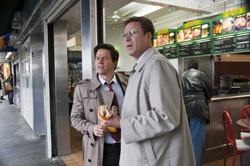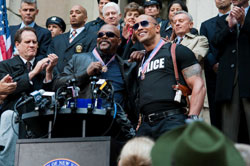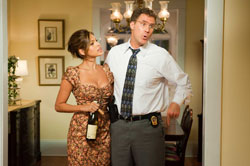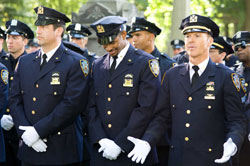The Other Guys is a buddy cop action-comedy pairing Will Ferrell with Mark Wahlberg as b-list New York cops who can’t do anything right, but manage to save the day. Directed by Adam McKay (Anchorman, Talledega Nights), the film contains all the sorts of things you’d expect: frat-pack silliness, Saturday Night Live-type characters, slapstick action, and celebrity cameos (Brooke Shields, Tracy Morgan, Derek Jeter, etc.). It also contains a few things you don’t really expect (Michael Keaton, undertones of economic critique), but for the most part it’s a pretty by-the-book comedy—which also happens to be raucously amusing.
Set against the backdrop of the bailouts/financial meltdown era of New York City (in which “CEO profiling” has become a problem), The Other Guys pits a couple of average Joes against a white-collar corporate villain (Steve Coogan). “The other guys” here refer to Allen (Ferrell) and Terry (Wahlberg), washed-up detectives who are the joke of their precinct. Allen is a nerdy, overly polite accountant happy to sit at his desk while others get in on the crime-solving action. Terry is his hotheaded partner eager to do something heroic. When the current hotshot detective duo (Samuel L. Jackson and Dwayne Johnson) meets an unexpected end, Allen and Terry stumble into the position of filling their shoes. They take it upon themselves to investigate a high profile, billion-dollar money-laundering scheme (or something like that), and find themselves in way over their heads.

Of course, as these movies typically go, the plot is merely a servant of the various outlandish setups and quirky characters that, while they have little to do with anything story-wise, are the film’s bread and butter. This includes numerous gratuitous explosions and gun battles (with, apparently, Nigerian and Chechen bad guys), an over-the-top “getting drunk” montage, flashbacks to Allen’s “dark college days,” jokes about homeless orgies, and various and sundry other sophomoric (and sometimes tasteless) amusements.
The funniest bits in The Other Guys have to do with the characters and their respective quirky schticks. Ferrell, the master of absurdist acting, plays Allen’s aw-shucks innocence with characteristic charm. He’s a nerdy guy who drives a Prius, loves his iPhone apps, and somehow attracts beautiful women (though he insists to others that his wife—the gorgeous Eva Mendes—is “cute, but not hot”). Ferrell’s over-the-top acting pairs well with Wahlberg, whose Terry is macho and straightforward, yet not without his own odd neuroses (he likes to call himself a peacock and once became an expert at ballet so he could beat the “neighborhood fairy” at his own game).

Though Ferrell and Wahlberg have great chemistry and more than fit the buddy-cop bill, they are not the only funny people in The Other Guys. As the police captain who also works part-time at Bed, Bath & Beyond, Keaton offers unexpected comic brilliance; his penchant for quoting TLC song lyrics is just the sort of unexpected randomness that drives a film like this. Mendes more than holds her own opposite Ferrell and Wahlberg, though her character is relegated to mostly sexualized eye candy.
The Other Guys, like the testosterone-heavy “frat-pack” films which Ferrell has come to be known for (Old School, Talledega Nights), is a movie for guys—or, rather, millennial adolescent boys. It’s a buddy-cop film for a new generation, replacing the semi-serious plots of its predecessors (Lethal Weapon, Beverly Hills Cop, Starsky and Hutch) with postmodern pastiche ridiculousness that is at once savvy, nostalgic, irreverent, and heartfelt.

Preaching a working class message of populist, New Jersey Springsteen grit (pay attention to the little guy! Down with the corporate fat cats!), The Other Guys will likely resonate with the middle class audiences it’ll doubtless attract. Though it’s hard to take anything too seriously in this film, the underlying message of empowering the underlings seems very timely and appropriate for this post-ponzi-scheme Bernie Madoff era. In the ’80s, buddy cop films often pit working class cops against wealthy financial criminals, so in some sense The Other Guys is simply appropriating that genre for a new era, but with a diminished commitment to verisimilitude.

One of the film’s most interesting and unexpected elements comes in the closing credits, which consists in a series of graphs and charts that expose shocking facts and comparisons about the “too big to fail” bank bailouts, CEO salaries, and “here’s how much each taxpayer will have to pay to bail out the banks” statistics. For a film that revels in excess, it’s probably a bit disingenuous to get preachy about the excesses of Wall Street in an awkward coda like this, but audiences unfamiliar with the contemporary economic landscape might learn some eye-opening facts, which is not a bad thing.
That sequence aside, The Other Guys is in no way an educational, smart, or culturally enlightening film. But it is well acted and suitably funny, and less obscene than most popular comedies these days. If all you want is to laugh at the movies for two hours this summer, you won’t find much better than The Other Guys. Just don’t expect much more.
Talk About It
Discussion starters- Why do Terry and Allen need each other? What does this film say about friendship and camaraderie?
- Who are the “other guys” in your life or community who don’t get credit for the heroic lives they lead?
The Family Corner
The Other Guys is rated PG-13 for crude and sexual content, language, violence and some drug material. It’s not nearly as offensive as some of the raunchy film fare that adolescents consume these days. There is no nudity or sex. But there is a lot of language (including several f-words), plenty of sexual innuendo, and quite a bit of violence (though mostly comic violence). It’s not “wholesome” by any means, but if teens are going to see a comedy, better this than The Hangover.
Photos © Columbia Pictures.
Copyright © 2010 Christianity Today. Click for reprint information.












